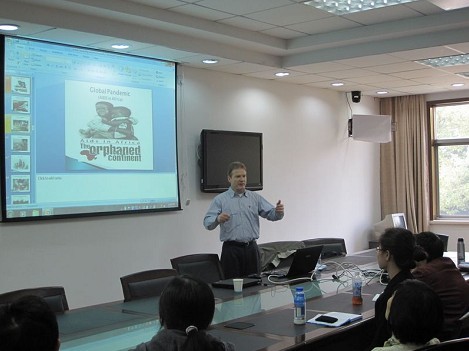On Nov, 4th, 2010, Professor Robert Rhoads from UCLA was invited to visit the College of Education. He gave two lectures to the faculties and doctoral students in Conference Room 228. The lecture in the morning was on the topic “Global Citizenship and the University: Advancing Social Life and Relations in an Interdependent World”; and in the afternoon it was on “The Entrepreneurial American University: Necessary Marketization or Out-of-Control Academic Capitalism?” Both were hosted by Professor Xu Xiaozhou, the Deputy Dean of the College of Education. The lectures were warmly welcomed, and both were great successes. There were heated discussions with Professor Rhoads after the lectures.

The lecture in the morning started with the concept of citizenship and globalization. Professor Rhoads explained the influence of globalization on universities and on nation-state citizenship, and the functions that universities can play in the forming of global citizenship. Using a qualitative approach, he selected four universities among institutions world-wide as case studies. He used two dimensions, namely individualism-collectivism, and local-global, to identify four different types of citizenship: locally informed individualist, locally informed collectivist, globally informed individualist, and globally informed collectivist. He pointed out that you can not simply say which is good or which is bad, because they all make sense in specific conditions. However, in the context of globalization, universities should contribute to the promotion of the idea of globally informed collectivist.
The lecture in the afternoon focused on the entrepreneurial American university. Professor Rhoads reviewed the historical development of American universities: Following British fashion—German influence—support from federal government—multiversity era—universities influenced by neoliberal ideas. The historical review explained the reasons and path of entrepreneurial American universities. He then analyzed the changing role of university staff and the changing relationships both within university and between university and the outside, so as to reveal the characteristics of the entrepreneurial American university and its influence upon university function. He recognized the reason and its contribution to the prosperity of scientific research of the entrepreneurial route; however, he also pointed out its negative impact on humanities, social sciences, academic freedom, public interest and other areas. Finally, he employed the idea “power regime” by Michel Foucault to explain the dominant power of Academic Capitalism in American higher education, and the indomitable vitality of the humanities and social sciences and the indomitable struggle of the power of public good. He asked for more attention and support for the latter two in order to bring the out-of-control academic capitalism under control.

Professor Rhoads’ lectures provided listeners with abundant information and helped to stimulate deep thinking over the issues of globalization, the university, and the entrepreneurial university. After the lectures, audience members interacted with Professor Rhoads actively. Issues such as the function of the research oriented university, globalization and internationalization, the conflicts between the identity of globalization and the identity of nation-state citizenship, and the conflicts between administrative power and academic power were further discussed.
Introduction to Prof. Robert Rhoads:
Professor Rhoads works for the University of California, Los Angeles (UCLA). He focuses on social movements and the university; the role of the university in advancing global peace, social justice, and democracy; globalization and the university; and the university and economic/social change in the developing world. He is now a Fulbright visiting scholar in China.


